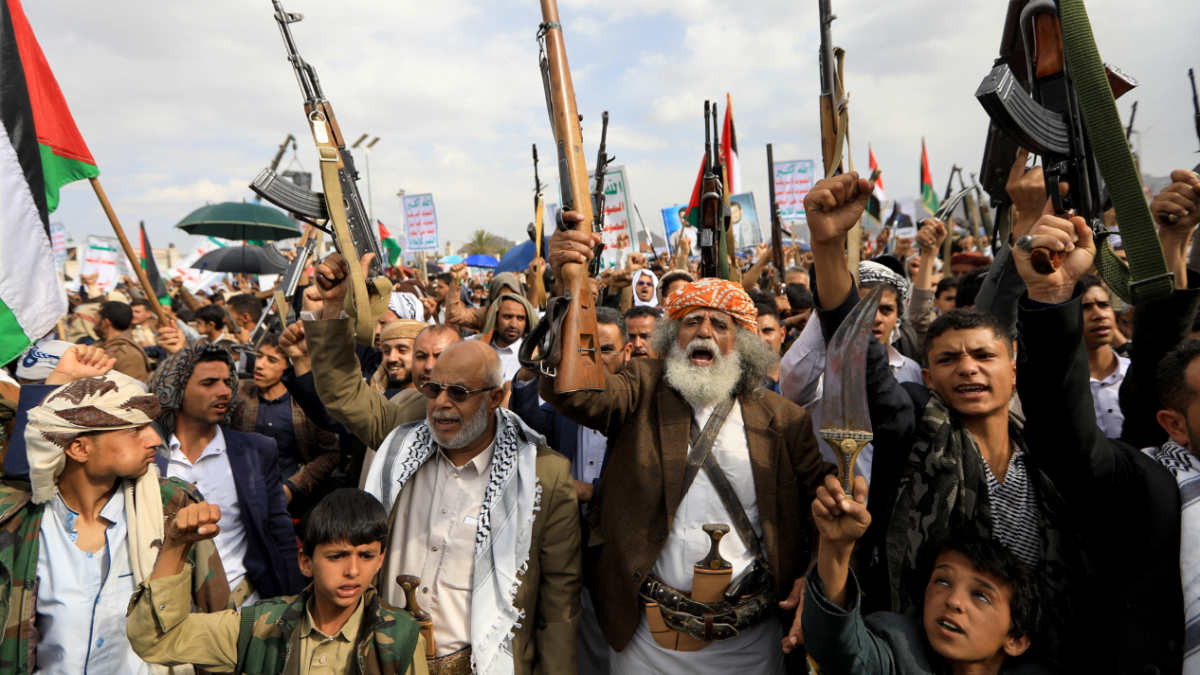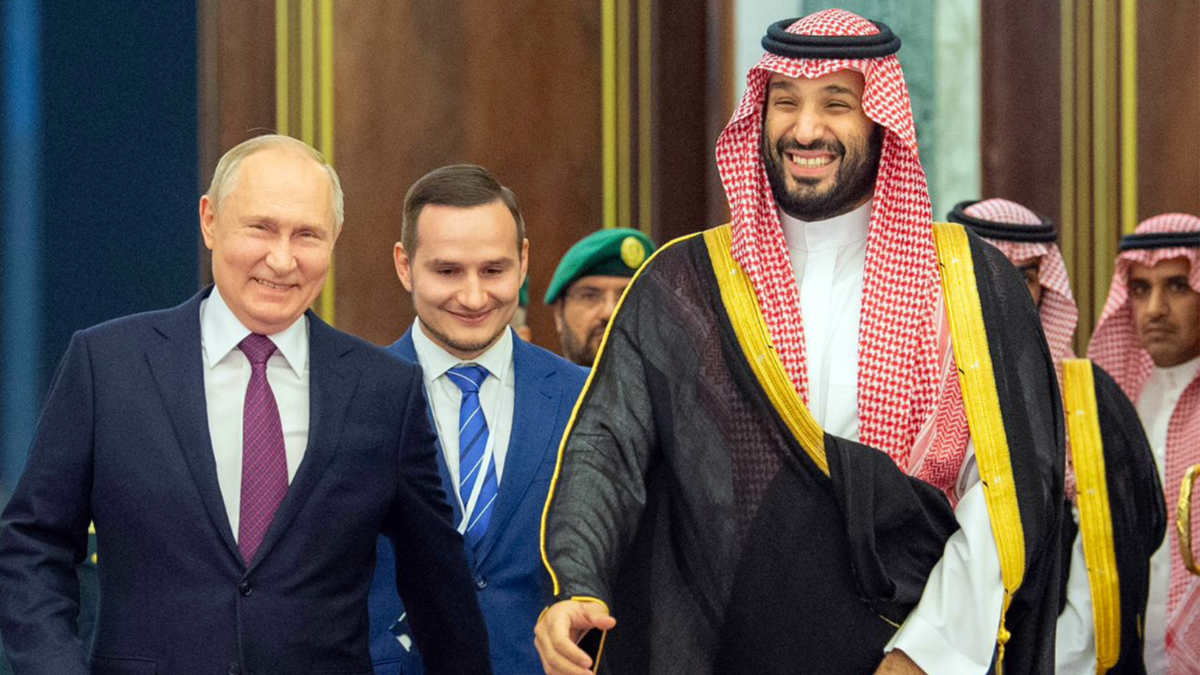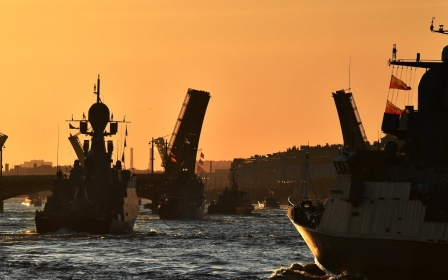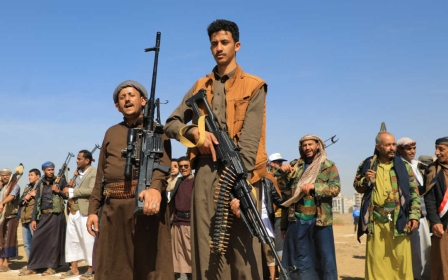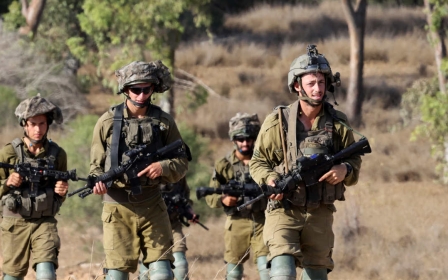US officials concerned Israeli offensive on Hezbollah could drag in Russia
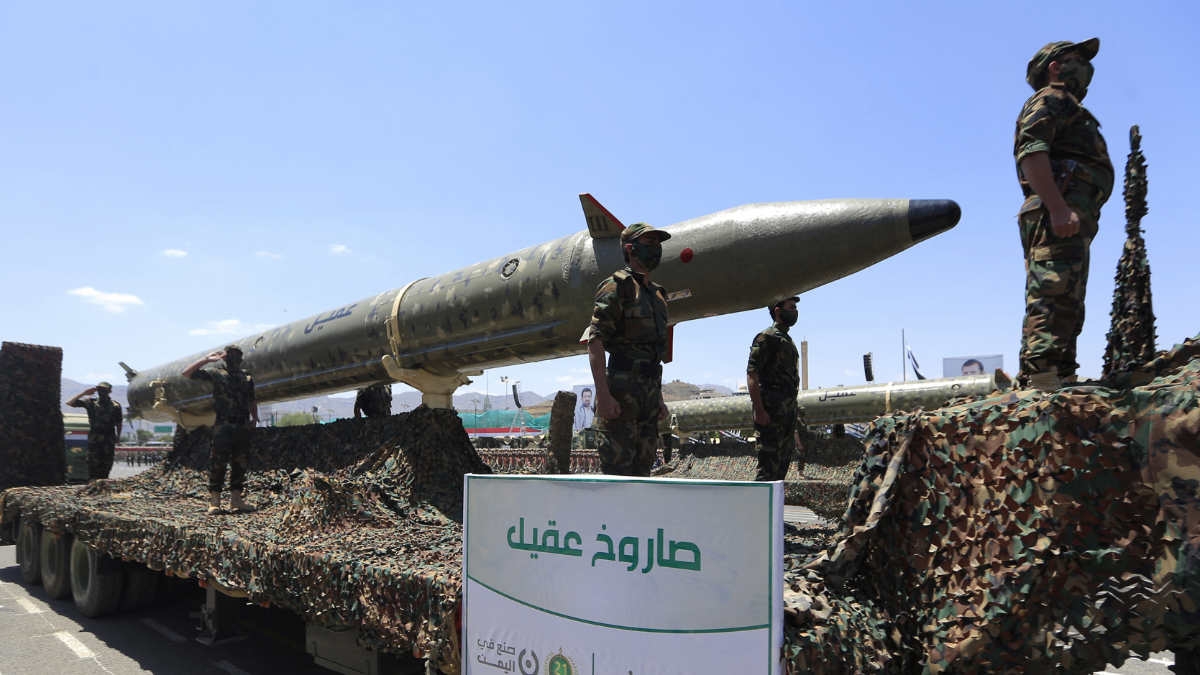
US defence and intelligence officials are concerned that an Israeli invasion of Lebanon could further ignite Iran's allies in the region and cement Tehran's military cooperation with Russia.
The fears of what current and former US officials described to Middle East Eye as "secondary" and "tertiary" effects of an Israeli ground attack on Hezbollah are being driven by US intelligence that claims Russia is considering stepping up its support for Iran's so-called Axis of Resistance.
In Yemen, Russian President Vladimir Putin has considered providing Houthi rebel fighters with anti-ship cruise missiles, a senior US official told MEE, citing intelligence, and speaking on condition of anonymity to discuss the sensitive report.
The notion is not unprecedented. In November, the Wall Street Journal reported that the Wagner group, a Russian paramilitary, planned to provide Lebanon's Hezbollah with a Russian air defence system.
"If Israel attacks inside Lebanon it would likely prompt a further deepening of the military relationship that Iran has with Russia in order to help Hezbollah defend itself," William Usher, a former senior Middle East analyst at the CIA, told MEE.
New MEE newsletter: Jerusalem Dispatch
Sign up to get the latest insights and analysis on Israel-Palestine, alongside Turkey Unpacked and other MEE newsletters
“Russia could already be thinking about how it would assist the Houthis.”
Russia is allied with Iranian forces and allied groups supporting President Bashar al-Assad in Syria. In January, the Kremlin's top Middle East official Deputy Foreign Minister Mikhail Bogdanov received a Houthi delegation in Moscow.
Mohammed bin Salman vetoes transfer
Providing arms to the Houthis, however, is potentially more sensitive than aiding Hezbollah because of Russia's efforts to court oil-rich Gulf states.
According to US intelligence, Saudi Arabian Crown Prince Mohammed bin Salman intervened to stop Putin from providing the Houthis with missiles.
'There is a connection between Russia’s war on Ukraine and the Red Sea,'
- General Frank Mckenzie, former head of Centcom
MEE reached out to the White House and Pentagon for comment on the US intelligence but didn't receive a reply by time of publication. Saudi Arabia's embassy in Washington and Russia's foreign ministry did not respond to requests for comment.
“Putin engaged Mohammed bin Salman who requested them [Russia] not to pursue the arrangement," the senior US official told MEE.
The discussions took place after Putin's December visit to Saudi Arabia and the UAE, according to US intelligence. During the December meeting, Reuters reported that Putin and Mohammed bin Salman agreed to "remove tensions" in the region.
Any Russian effort to provide weapons to a member of Iran's so-called axis of resistance fighting against the US and its allies would be a turnaround.
Moscow has purchased thousands of Iranian drones and has tapped the Islamic Republic's expertise to domestically produce its own version of the Iranian Shahed drone. Russia has also turned to Iran for surface-to-surface ballistic missiles, according to Reuters.
Cruise missiles on 'Houthi's shopping list'
But Fabian Hinz, an expert on ballistic and cruise missiles at the International Institute for Strategic Studies, said that between the Houthis and Russia, supply and demand matches.
The Houthis have generally relied on drones and ballistic missiles to attack ships. Their cruise missile arsenal contains models based on Iranian production. The two most prominent the Houthis have displayed are Quds missiles and al-Mandeb 2 missiles, Hinz said.
Cruise missiles are generally slower than ballistic missiles, but fly low to the ground, making them harder to detect and more precise because they can be guided throughout their flight. They are well-suited to attack specific targets like vessels.
“If I was the Houthis, supersonic cruise missiles would be very high-up on my shopping list,” Hinz said. “And the Russians have quite good supersonic anti-ship cruise missiles.”
Hinz said Russia could supply the Kh-31 supersonic anti-ship missile, which is air launched but can be converted to ground launch and has been widely exported, including to Venezuela and Yemen before its civil war.
'Moscow jumping for joy'
The Houthis began attacking commercial ships in the Red Sea in November in what they said was solidarity with besieged Palestinians in Gaza. Their attacks pose a challenge to US President Joe Biden's administration's goal of preventing a widening of the war on Gaza.
Houthi attacks died down during the Muslim holy month of Ramadan, but as fighting between Hezbollah and Israel intensified in June, they have increased.
The Tutor, a Greek-owned vessel, was sunk last week after it was attacked by a Houthi bomb-laden drone boat. US officials said that Russian vessels were among ships close enough to respond to the Tutor's distress calls, but didn't.
'From the Russian perspective, it's let the Americans get drawn into war with Iran's proxies'
- Patrick Theros, former US ambassador to Qatar
Also in June, the Houthis attacked a Ukrainian-owned vessel, forcing it to be towed to a nearby port.
"There is a connection between Russia's war on Ukraine and the Red Sea," General Frank Mckenzie, the retired commander of US Central Command, told MEE.
"Putin sees the US responsible for Ukrainian attacks on Russian vessels in the Black Sea. It is possible he could see doing something in the Red Sea as payback."
Russia sees a widening of the war in the Middle East as an opportunity to impose costs on the US over its support for Ukraine, but the Kremlin is constrained by its diplomatic ties to the Gulf and focus on fighting in Europe, former US officials and analysts say.
Russia relies on oil-rich Gulf states to show it is not isolated on the world stage. The UAE has become a top destination for Russian entities looking to evade US sanctions, and Russia supported Saudi Arabia's move to join Brics as a challenge to the Western-led world order. In June, Saudi Arabia's foreign minister Prince Faisal bin Farhan attended a Brics meeting in Russia.
Russia and Saudi Arabia are also partners in an energy alliance dubbed Opec+. Energy experts say Saudi Arabia has done most of the heavy lifting to support oil prices, by restraining output, while Russia and the UAE benefit from higher prices and more production. Russia depends on oil-revenue to fund its war in Ukraine.
Saudi Arabia and the UAE launched a bloody campaign against the Houthis after Yemen descended into civil war in 2014.
The Saudi-led coalition launched thousands of air strikes on Yemen which failed to dislodge the Houthis but resulted in thousands of civilian deaths and a major humanitarian crisis. The Houthis responded by lobbing missiles and drones at Saudi Arabia and the UAE.
"The Russians have a really good thing going in Opec+ with the Saudis," Patrick Theros, the former US ambassador to Qatar told MEE. "From the Russian perspective, it's let the Americans get drawn into war with Iran's proxies. Moscow will be jumping for joy, but they don't want to isolate Riyadh."
But current and former US officials say that should Israel launch an offensive on Hezbollah that could prompt Russia to look for ways to extract more of a cost on the US. The US has signalled it would support an Israeli offensive on Hezbollah in the coming weeks, MEE revealed earlier this month.
"Russia does not want to risk alienating Saudi Arabia," Samuel Ramani, an expert on Russia's foreign policy in the Middle East and Africa at the Royal United Services Institute, told MEE.
"But an Israeli attack on Hezbollah could hurt Iran and the axis of resistance's position in Syria."
Drawing Russia in
Russia's only Mediterranean naval presence is in Syria's port of Tartus. Russia is already eyeing other ports in the Middle East region. MEE reported in June that Russian moves to secure a Red Sea naval base in Sudan were moving ahead.
The Houthis have vowed to expand their maritime attacks beyond the Red Sea to the Mediterranean. Houthi officials have promised not to attack Russian vessels. The Houthis have relied on rudimentary open source intelligence and Iranian support to target vessels, but have at times hit vessels linked to Iran and even Russia.
'First, if Israel attacks Hezbollah it's going to make a big mistake. But if the US supports it, Russia will come in'
- Patrick Theros, former US ambassador to Qatar
Like other Middle Eastern allies of the US, Israel and Russia have maintained ties despite the war in Ukraine.
However, Russia's deepening military ties to Iran have emerged as a sour point in the relationship. On Thursday, the Financial Times reported that Israel is in discussions to provide US Patriot air defence systems to Ukraine, a move likely to strain ties between Israel and Moscow.
Theros, the former US ambassador, said that if the US backs an Israeli attack on Hezbollah, as it has signalled, it could draw in Russia.
"First, if Israel attacks Hezbollah it's going to make a big mistake. But if the US supports it, Russia will come in," Theros said.
"The Russians could supply the Houthis through the Iranians covertly, or provide more intelligence. I could even see a few odd Russians showing up in Yemen to help the Houthis."
Middle East Eye delivers independent and unrivalled coverage and analysis of the Middle East, North Africa and beyond. To learn more about republishing this content and the associated fees, please fill out this form. More about MEE can be found here.


